Religions for Peace Hosted “Guardians of the Rainforest: A Film Screening” Highlighting the Vital Work of Indigenous Women in Protecting the World’s Remaining Rainforests
October 2, 2023On 20 September, Religions for Peace, in collaboration with Aurora Vision and Handshake, was pleased to host an in-person film screening of Guardians of the Rainforest, on the margins of the 78th United Nations General Assembly (UNGA 78).
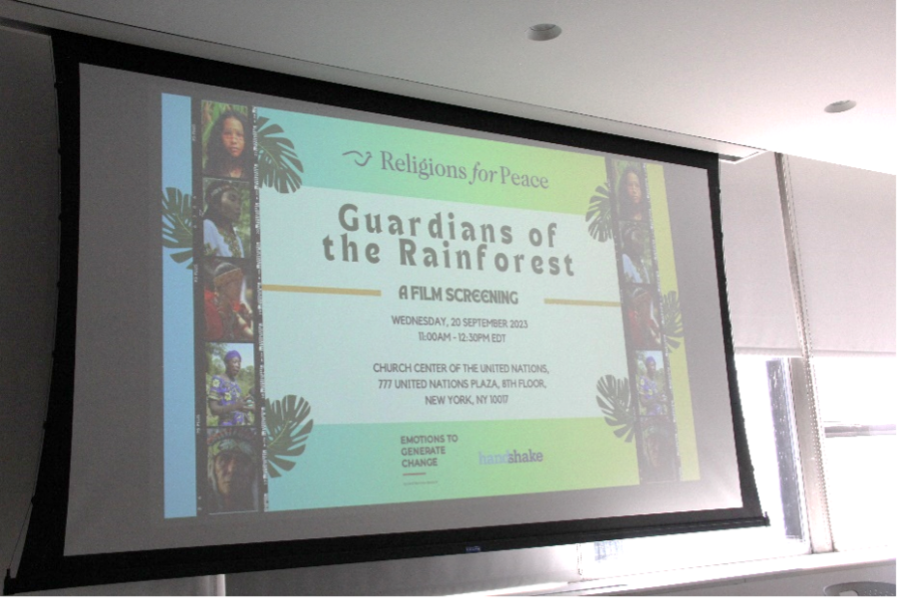 Guardians of the Rainforest is a documentary supported by multi-religious efforts to highlight the vital work of Indigenous women who are speaking out to defend the rainforests in Brazil, the Democratic Republic of the Congo (DRC), and Indonesia. The documentary was directed by award-winning filmmakers Ms. Lia Beltrami and Ms. Marianna Beltrami, with the support of Religions for Peace, a lead implementing partner of the Interfaith Rainforest Initiative (IRI), a United Nations-led global programme that brings moral agency and faith-based leadership to protect the rainforests and its Indigenous guardians.
Guardians of the Rainforest is a documentary supported by multi-religious efforts to highlight the vital work of Indigenous women who are speaking out to defend the rainforests in Brazil, the Democratic Republic of the Congo (DRC), and Indonesia. The documentary was directed by award-winning filmmakers Ms. Lia Beltrami and Ms. Marianna Beltrami, with the support of Religions for Peace, a lead implementing partner of the Interfaith Rainforest Initiative (IRI), a United Nations-led global programme that brings moral agency and faith-based leadership to protect the rainforests and its Indigenous guardians.
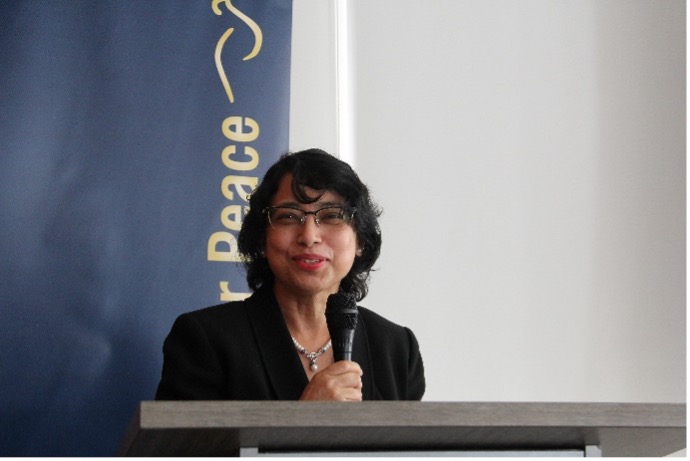 In her opening remarks, Ms. Deepika Singh, Associate Secretary General & Director of Programmes, Religions for Peace, recalled Religions for Peace’s active engagement with IRI since its launch in June 2017, reiterating its strong commitment to continue combatting tropical deforestation and protecting the rights of the rainforests’ Indigenous guardians.
In her opening remarks, Ms. Deepika Singh, Associate Secretary General & Director of Programmes, Religions for Peace, recalled Religions for Peace’s active engagement with IRI since its launch in June 2017, reiterating its strong commitment to continue combatting tropical deforestation and protecting the rights of the rainforests’ Indigenous guardians.
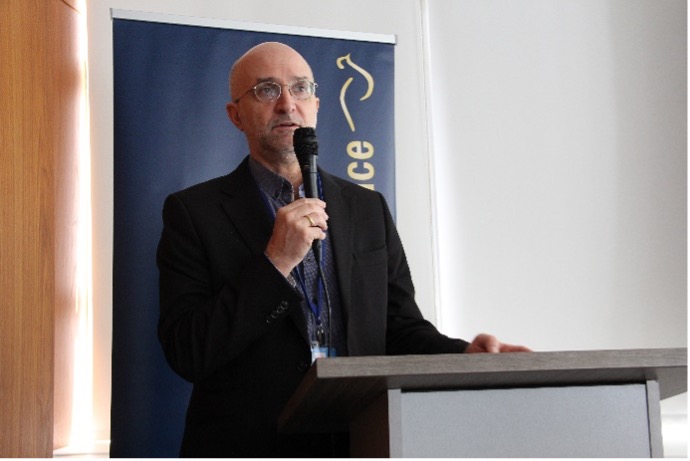 Mr. Gabriel Labbate, Head of the Climate Mitigation Unit, Global Team Leader of the UN-REDD Programme, United Nations Environment Programme, recognised Religions for Peace’s partnership as a testament to the importance of interfaith cooperation in tackling issues that threaten all of life and the planet, including tropical deforestation, environmental degradation, and the climate crisis.
Mr. Gabriel Labbate, Head of the Climate Mitigation Unit, Global Team Leader of the UN-REDD Programme, United Nations Environment Programme, recognised Religions for Peace’s partnership as a testament to the importance of interfaith cooperation in tackling issues that threaten all of life and the planet, including tropical deforestation, environmental degradation, and the climate crisis.
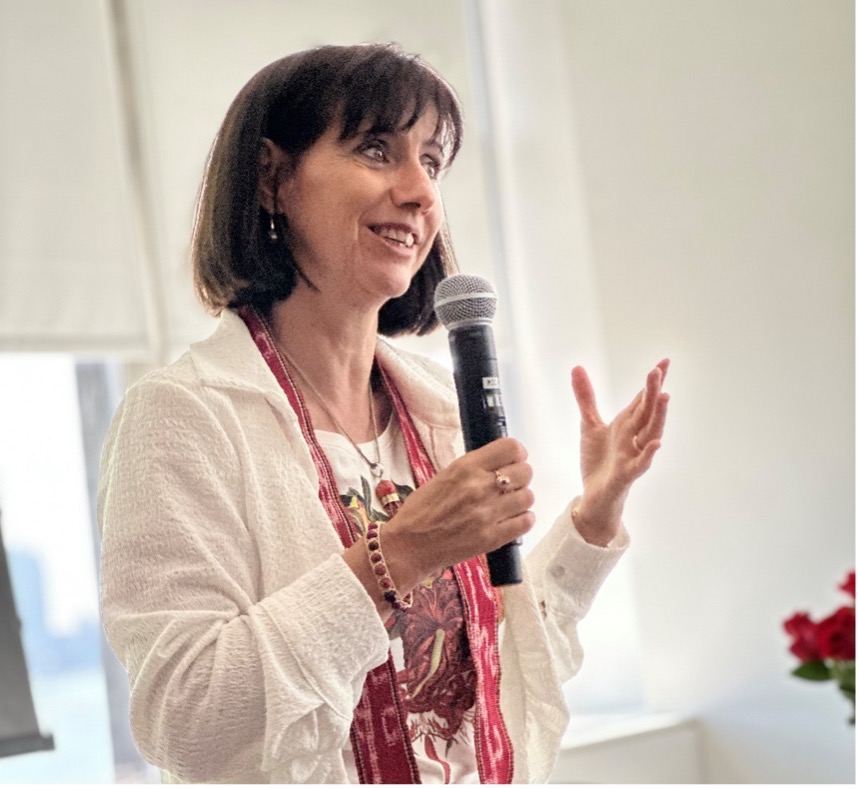
Prior to the film screening, Ms. Lia Beltrami, Film Director set the tone by introducing Guardians of the Rainforest as an observational documentary film that follows the lives and diverse voices of three Indigenous women in Brazil, the DRC, and Indonesia. As Indigenous communities are increasingly confronted by threats to their lives and lands – both from the climate crisis and concurrent environmental issues, and from groups of individuals seeking to exploit Indigenous culture and natural resources from rainforests – the film serves to highlight the vital role of Indigenous women and communities in protecting some of the world’s most precious sources of life and sustenance.
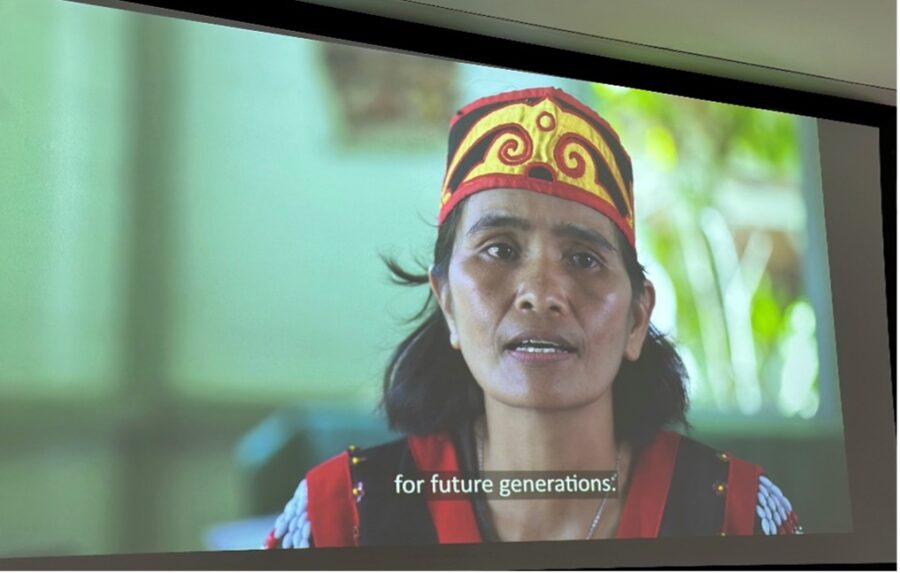
Featuring conversations with women leaders from various tribes (Dâw, Dayak, Pygmy, and Tuyuka peoples), the film documents the traditional ways of life of some Indigenous communities, as well as their sacred relationship with the rainforest, grounded in love and respect for Mother Earth and rich interpretations of humanity’s role as its guardians and stewards. The film also highlights Indigenous values and practices that promote a harmonious relationship with the Earth, based on the understanding that the Earth is not a resource to be exploited or abused, but a sacred gift that is entrusted with humanity for the sustenance and well-being of all forms of life.
Furthermore, the film also brought attention to the harsh realities faced by Indigenous women leaders in fighting for the recognition of the rights of their Indigenous communities to remain in their sacred lands and preserve the rich resources of the rainforests. The rights of Indigenous Peoples and the preservation of rainforests are often threatened by the lack of legislation and protection mechanisms, and exploitative actions by private corporations on rainforests and its rich biodiversity and natural resources. Despite this harsh reality, Indigenous women leaders and communities continue to protect rainforests with resilience and a deep connection and communion with Mother Earth.
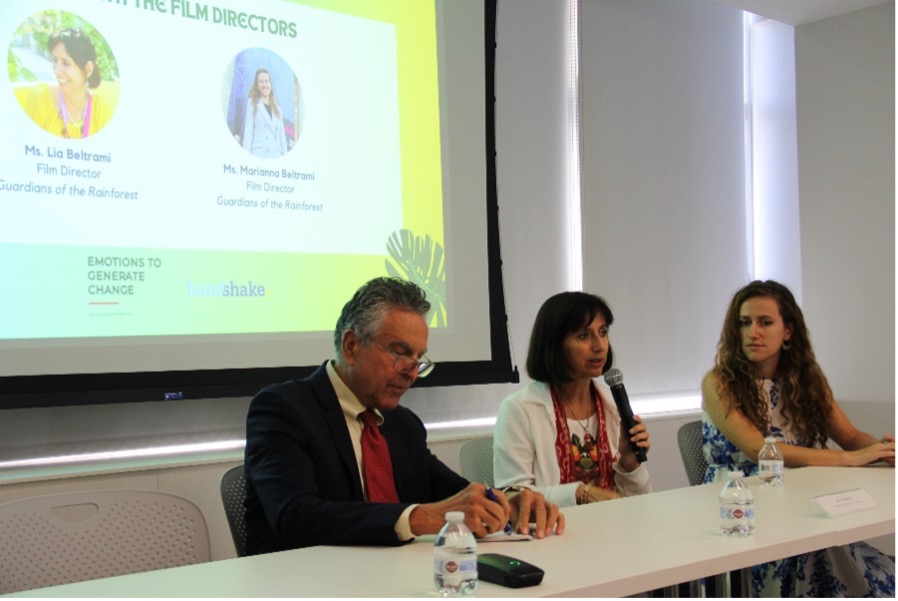
Following the film screening, Ms. Deepika Singh moderated a Q&A session with the film directors and Mr. Charles McNeill, Senior Adviser, Forests & Climate, United Nations Environment Programme (UNEP).
When asked about the main challenges her crew faced when filming, Ms. Lia Beltrami highlighted the importance of building a strong foundation of trust when engaging and living with Indigenous communities. Initially, some tribe members took a defensive attitude because of the ongoing challenges they face in protecting their communities and the rainforests from exploitation and encroachment. While the process of trust-building can take some time, Ms. Beltrami stressed that maintaining a genuine willingness to understand the harsh realities faced by Indigenous communities is instrumental in building an environment that is conducive to deep trust and knowledge-sharing. Building such relationships with the Indigenous communities, Ms. Beltrami noted, allowed her to connect with the tribes and capture their diverse ways of life, spiritual traditions, and wisdom. Acknowledging the profound impact that the filming experience had on her, Ms. Beltrami stated, “What we received [from the Indigenous communities] was so much more than what we have given.”
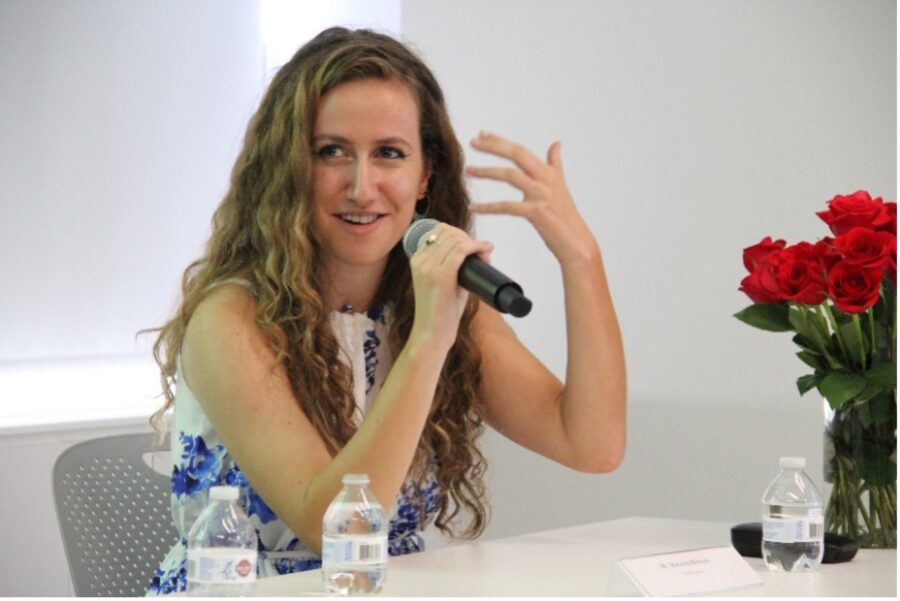 When asked about her experience being with and interviewing Indigenous and religious leaders from various faith traditions, Ms. Marianna Beltrami emphasised how “seeing the dialogue between organised religions and Indigenous Peoples was a deeply spiritual experience…seeing women from different groups and faiths working together was inspiring and incredible.” Having witnessed the various effects of environmental degradation and tropical deforestation, Ms. Beltrami noted, “People having to leave their homes because of deforestation in real life does things inside you and I am still figuring out how to enact change within myself.”
When asked about her experience being with and interviewing Indigenous and religious leaders from various faith traditions, Ms. Marianna Beltrami emphasised how “seeing the dialogue between organised religions and Indigenous Peoples was a deeply spiritual experience…seeing women from different groups and faiths working together was inspiring and incredible.” Having witnessed the various effects of environmental degradation and tropical deforestation, Ms. Beltrami noted, “People having to leave their homes because of deforestation in real life does things inside you and I am still figuring out how to enact change within myself.”
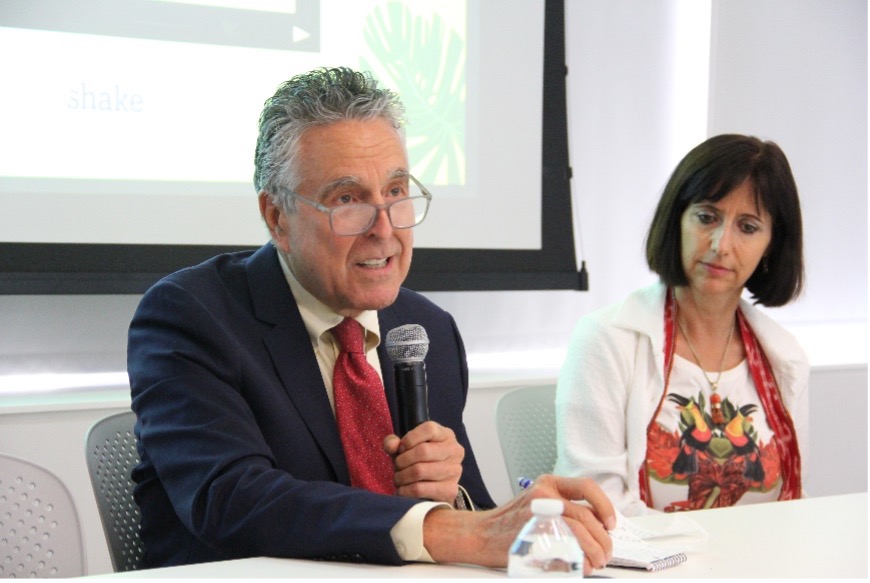 Speaking on ongoing issues that threaten all of life and the planet, Mr. Charles McNeill stressed, “It is evident: the world is on fire and underwater… We are experiencing the sixth mass extinction.” Stressing that our current economic systems are driving the climate crisis, he emphasised that sustainable and effective rainforest protection can only be accomplished by giving due recognition to and implementing policies that uphold the rights of Indigenous Peoples who have served as the guardians of the world’s rainforests for centuries. To this end, he emphasised the need for the world’s religious and faith communities to work together to transform the systems that have perpetuated the disenfranchisement of Indigenous Peoples.
Speaking on ongoing issues that threaten all of life and the planet, Mr. Charles McNeill stressed, “It is evident: the world is on fire and underwater… We are experiencing the sixth mass extinction.” Stressing that our current economic systems are driving the climate crisis, he emphasised that sustainable and effective rainforest protection can only be accomplished by giving due recognition to and implementing policies that uphold the rights of Indigenous Peoples who have served as the guardians of the world’s rainforests for centuries. To this end, he emphasised the need for the world’s religious and faith communities to work together to transform the systems that have perpetuated the disenfranchisement of Indigenous Peoples.
In closing, Mr. Alessandro Gisotti, Deputy Editorial Director of the Holy See Media offered his reflection on the film, stressing that Indigenous Peoples are not “backwards” communities that need to be “fixed.” Acknowledging the incredible resilience of Indigenous women leaders and communities, Mr. Gisotti stressed that, “While these women are clearly guardians, they are also mothers. They give life through their children and through the rainforest, which in turn, gives breath to all of life around the world. He concluded with the aspiration that young people and the next generations can witness the vital role of Indigenous Peoples in caring for our common home, noting, “We must spread the good work of these guardians.”